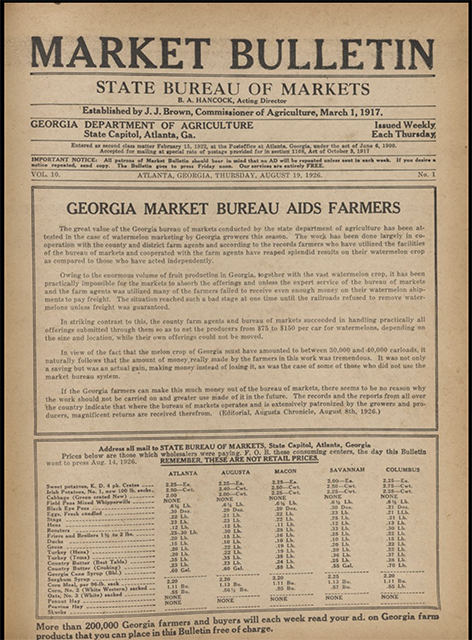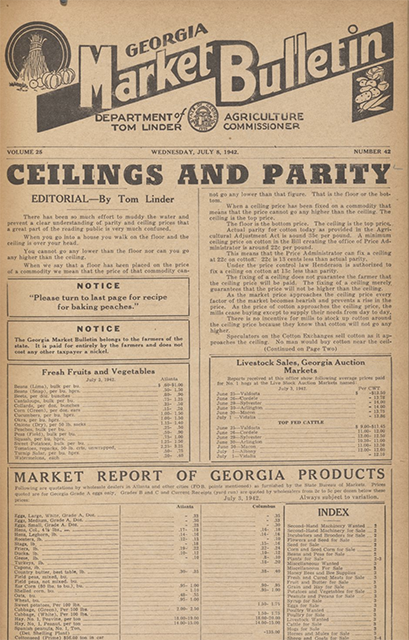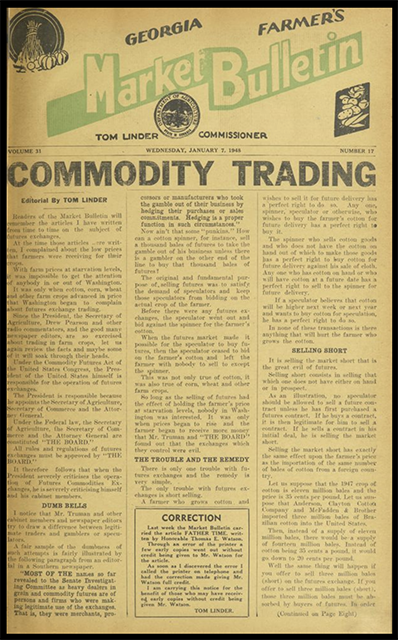Thanks to a partnership with the Georgia Department of Agriculture, the University of Georgia Map and Government Information Library (MAGIL), and the Digital Library of Georgia, more than 1,712 issues of the Farmers and Consumers Market Bulletin dating from 1926-1963 are now available in the Georgia Government Publications online database.
“We are fortunate that previous generations had the foresight to preserve early copies of the Georgia Market Bulletin, creating an archive that shows the incredible progression of agriculture from mule days to the technology age,”said Georgia Agriculture Commissioner Gary W. Black. “We are grateful for the partnership of the University of Georgia’s Map and Government Information Library and the Digital Library of Georgia in helping us preserve this archive in digital form and make it available to all Georgians. It is a valuable record of the tremendous strides we’ve made as both an industry and a society.”
The project began when Amy Carter, editor of the Farmers and Consumers Market Bulletin, reached out to UGA’s Georgia state documents librarian Sarah Causey, asking for help in preserving back issues that had begun to crumble.
“Amy and I both recognized this as a great opportunity to not only preserve her copies but to also enhance access by adding them to our digital collection of Georgia state publications in the DLG,” said Causey, who partnered with the Digital Library of Georgia to preserve and provide access to government documents and records that are part of MAGIL’s collections.
Farmers and Consumers Market Bulletin has published agriculture and consumer news and market information, and facilitated sales for livestock, farm equipment, and other needs for Georgia farmers and others in the industry since 1917.
“Throughout its 103-year history, the paper has served as a means of communication between the Georgia Department of Agriculture and its constituency which, when you think about it, is every Georgian,” Carter said. “The Market Bulletin still connects farmers with consumers seeking farm-fresh goods statewide, but it also serves as a vehicle for other divisions of the department such as Fuel and Measures, Plant Protection, Animal Health, Structural Pest, and the Georgia Grown marketing program to reach consumers with important news and information that directly impacts their daily lives.”
Carter added that the newspaper’s archives demonstrate changing trends in farming over the decades, and a popular recipe feature continues today.
“If you look at today’s paper, you’ll see that the Farm Machinery category of our Classified ads section is very popular. Many people buy and sell second-hand tractors, combines, pickers, and tillers from and to fellow growers through the Market Bulletin. Between the 1920s and the 1950s, however, that was actually a very small percentage of our advertising,” she said. “Livestock, poultry, seeds, flowers, honeybees, and even chewing tobacco were much more in demand. Another popular item advertised for sale from the Great Depression up until the 1960s was ‘sackcloth’ – burlap or cotton feed and seed bags repurposed to make clothes, curtains, towels, all manner of household goods. You can tell by reading those ads that farmers quickly seized upon a lucrative ‘side hustle’ by washing, ironing, and selling the sacks that contained their livestock feed and crop seed.”
About the Georgia Department of Agriculture
The mission of the Georgia Department of Agriculture is to protect consumers, promote agriculture both locally and globally, and assist our customers using education, technology, and a professional workforce.
The vision of the Georgia Department of Agriculture is to continue to be a globally recognized leader in agricultural excellence through a commitment to safety, quality, growth, and innovation.
About the University of Georgia Map and Government Information Library (MAGIL)
The Map and Government Information Library (MAGIL) is located in the sub-basement of the Main Library on North Campus. Its mission is to provide bibliographic, physical, and intellectual access to cartographic and government information in all formats.
The UGA Libraries serves as Georgia’s regional depository for documents published by the Federal government as well as the official depository for documents published by the State of Georgia. Its collections also include select international and United Nations documents. Cartographic resources include maps, aerial photography and remote sensed imagery, atlases, digital spatial data, and reference materials, with a particular emphasis on the state of Georgia.
Maps and government documents have been an integral part of the University of Georgia Libraries for over 100 years. For more information, read about the history of MAGIL.
About the Digital Library of Georgia
Based at the University of Georgia Libraries, the Digital Library of Georgia is a GALILEO initiative that collaborates with Georgia’s libraries, archives, museums, and other institutions of education and culture to provide access to key information resources on Georgia history, culture, and life. This primary mission is accomplished through the ongoing development, maintenance, and preservation of digital collections and online digital library resources. DLG also serves as Georgia’s service hub for the Digital Public Library of America and as the home of the Georgia Newspaper Project, the state’s historic newspaper microfilming project. Visit the DLG at dlg.usg.edu.


https://dlg.usg.edu/record/dlg_ggpd_i-ga-ba400-b-pp1-bf2-b25-s42

https://dlg.usg.edu/record/dlg_ggpd_i-ga-ba400-b-pp1-bf2-b31-s17

